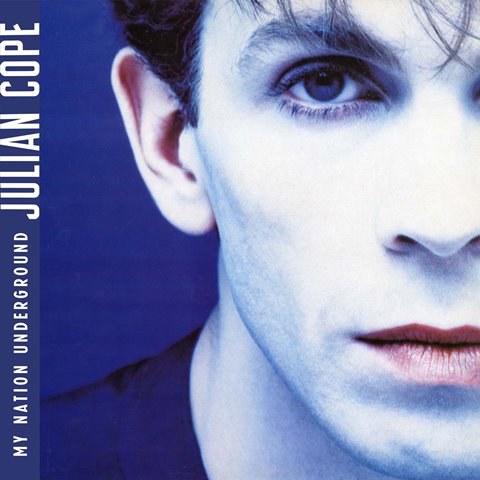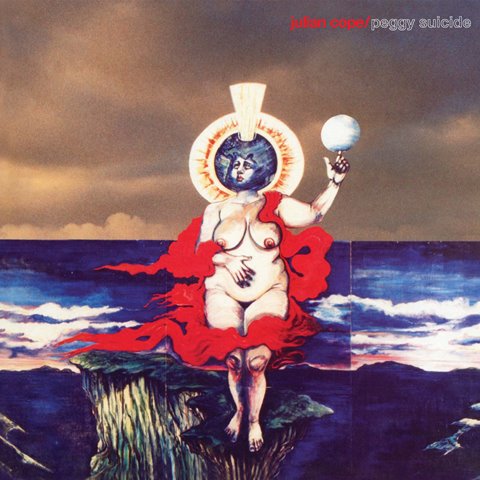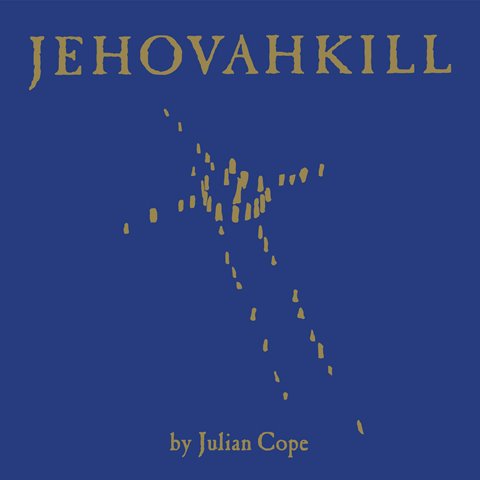Reissue CDs Weekly: Julian Cope | reviews, news & interviews
Reissue CDs Weekly: Julian Cope
Reissue CDs Weekly: Julian Cope
The four albums from the rocky years with Island Records hit the shops again

In terms of chart statistics, Julian Cope’s period with Island Records looks pretty good. He issued four albums with the label and all of them charted. Saint Julian (issued in March 1987) peaked at 11, My Nation Underground (October 1988) stalled at 42 but Peggy Suicide (March 1991) and Jehovakill (October 1992) climbed to 23 and 20 respectively. Not bad.
Yet Jehovakill became his last album for Island and, in 1994, he signed with the Chrysalis Records subsidiary Echo for whom Autogeddon climbed to a 16 position. The chart statistics tell part of the story.
 With Island, the release schedule was not linear. Between My Nation Underground and Peggy Suicide, Cope issued the raw, barely produced, musical stream of consciousness albums Skellington and Droolian on independent labels. Skellington was recorded at the same time as My Nation Underground, using Island’s money. And after Peggy Suicide, Island themselves released the Floored Genius - The Best of Julian Cope and The Teardrop Explodes 1979-91 compilation, presumably a reminder to the market and maybe themselves too of the identity of the Julian Cope they had signed
With Island, the release schedule was not linear. Between My Nation Underground and Peggy Suicide, Cope issued the raw, barely produced, musical stream of consciousness albums Skellington and Droolian on independent labels. Skellington was recorded at the same time as My Nation Underground, using Island’s money. And after Peggy Suicide, Island themselves released the Floored Genius - The Best of Julian Cope and The Teardrop Explodes 1979-91 compilation, presumably a reminder to the market and maybe themselves too of the identity of the Julian Cope they had signed
The arrival of vinyl-only reissues of Saint Julian, My Nation Underground, Peggy Suicide and Jehovakill offers a chance to ponder what Cope was up to during his dance with Island. Although contracted to the label, he concurrently issued albums for other imprints. Surprisingly Island, despite the relative commercial failure of My Nation Underground in 1988 and the implicit nose-thumbing directed towards them, stuck with him into 1992. What then, did Island have on their hands?
Island picked up Cope after he made the fragmented but great Fried album for Mercury in 1985. That had followed the mostly poppy, average-selling and also great World Shut Your Mouth, his first post-Teardrop Explodes solo album. Fried resulted in Mercury dropping him. In essence, then, Cope’s messy tenure with Island was an elongated version of what had already happened with Mercury.
 Saint Julian, the initial Island album, was analogous with World Shut Your Mouth. Quirky, hard-driving and pop oriented, it even featured a track called “World Shut Your Mouth”. The cover image of a leather clad, beatific-faced, seemingly crucified Cope in a snow-encrusted scrapyard was hard to decode. Did he have a God complex? Was he a saint in a world that was a garbage heap? Whatever the interpretation, it was a fine, consistent album.
Saint Julian, the initial Island album, was analogous with World Shut Your Mouth. Quirky, hard-driving and pop oriented, it even featured a track called “World Shut Your Mouth”. The cover image of a leather clad, beatific-faced, seemingly crucified Cope in a snow-encrusted scrapyard was hard to decode. Did he have a God complex? Was he a saint in a world that was a garbage heap? Whatever the interpretation, it was a fine, consistent album.
Its follow-up, My Nation Underground, was neither fine nor consistent. Sonically buffed up to a high gloss with a mix by Police producer Hugh Padgham, it featured two cover versions amongst its nine tracks: hardly a sign of flowing creative juices. It sounded like – and still sounds like – the sort of album a record company would want if they were trying to break an artist on American radio. Cope likely knew this as he recorded what became Skellington at the same time, at the same sessions. The rickety, self-funded Droolian soon followed. Even though he had gone along with it, the contrary Julian Cope was venting his opinion about being buffed-up to a high gloss.
Effectively, by recording and releasing material for other labels, Cope had breached his contract with Island (whatever on-the-hoof agreements were made with them). But rather than dumping him, the label issued the double album Peggy Suicide in 1991. This was a different Julian Cope. He did not appear on the album’s front cover and the rear of the sleeve featured him with his costumed alter-ego Squabsy. The album drew from his feelings about the death of his friend Pete de Freitas (Echo & The Bunnymen’s drummer) and a growing sense that the world was not in safe hands. There was no dalliance with the mainstream and the album was all-the better for it. It is one of Cope’s best.
 Jehovakill followed. While a little further out than Peggy Suicide and with a leaning towards Krautrock, it was another strong set and is close to Cope’s best. However, that was it for him and Island. The label terminated his contract soon after its release.
Jehovakill followed. While a little further out than Peggy Suicide and with a leaning towards Krautrock, it was another strong set and is close to Cope’s best. However, that was it for him and Island. The label terminated his contract soon after its release.
The four Island albums chart an erratic path, one ultimately resulting in the self-determining Julian Cope of today. The reissues have no bonus tracks (for such, look for previous CD editions of Saint Julian and Jehovakill – the other two have not had expanded-edition CD reissues), are packaged as they were originally and sound fine. There is no information on the mastering and the first two sound treblier then original pressings. The cover images of Saint Julian and My Nation Underground look softer than those of the originals, as if they draw from scans of sleeves rather than the original album artwork. The new Jehovakill does not have a gatefold sleeve like the original (Side 4 is etched and has no music, also as per the original), but lacks its booklet.
Good condition second-hand copies of each album, excluding Jehovakill, sell for between £7 and £20. An original of Jehovakill with is its booklet insert can sell for up to £80. These represses are pegged at between £20 and £27. Whether or not a new reissue or a second-hand copy is chosen, start with Peggy Suicide, track back to Saint Julian and then move forward to Jehovakill. Next, find Skellington and Droolian. Treat My Nation Underground as a footnote.
- Next week: Burning Britain, a brain-busting 4CD set of “Independent UK Punk 1980–1983”
- Read more reissue reviews on theartsdesk
Buy
Share this article
The future of Arts Journalism
You can stop theartsdesk.com closing!
We urgently need financing to survive. Our fundraising drive has thus far raised £49,000 but we need to reach £100,000 or we will be forced to close. Please contribute here: https://gofund.me/c3f6033d
And if you can forward this information to anyone who might assist, we’d be grateful.

Subscribe to theartsdesk.com
Thank you for continuing to read our work on theartsdesk.com. For unlimited access to every article in its entirety, including our archive of more than 15,000 pieces, we're asking for £5 per month or £40 per year. We feel it's a very good deal, and hope you do too.
To take a subscription now simply click here.
And if you're looking for that extra gift for a friend or family member, why not treat them to a theartsdesk.com gift subscription?
more New music
 Album: Mulatu Astatke - Mulatu Plays Mulatu
An album full of life, coinciding with a 'farewell tour'
Album: Mulatu Astatke - Mulatu Plays Mulatu
An album full of life, coinciding with a 'farewell tour'
 Music Reissues Weekly: Sly and the Family Stone - The First Family: Live At Winchester Cathedral 1967
Must-have, first-ever release of the earliest document of the legendary soul outfit
Music Reissues Weekly: Sly and the Family Stone - The First Family: Live At Winchester Cathedral 1967
Must-have, first-ever release of the earliest document of the legendary soul outfit
 Album: Robert Plant - Saving Grace
Mellow delight from former Zep lead
Album: Robert Plant - Saving Grace
Mellow delight from former Zep lead
 Brìghde Chaimbeul, Round Chapel review - enchantment in East London
Inscrutable purveyor of experimental Celtic music summons creepiness and intensity
Brìghde Chaimbeul, Round Chapel review - enchantment in East London
Inscrutable purveyor of experimental Celtic music summons creepiness and intensity
 First Person: Musician ALA.NI on how thoughts of empire and reparation influenced a song
She usually sings about affairs of the heart - 'TIEF' is different, explains the star
First Person: Musician ALA.NI on how thoughts of empire and reparation influenced a song
She usually sings about affairs of the heart - 'TIEF' is different, explains the star
 Album: NewDad - Altar
The hard-gigging trio yearns for old Ireland – and blasts music biz exploitation
Album: NewDad - Altar
The hard-gigging trio yearns for old Ireland – and blasts music biz exploitation
 Album: The Divine Comedy - Rainy Sunday Afternoon
Neil Hannon takes stock, and the result will certainly keep his existing crowd happy
Album: The Divine Comedy - Rainy Sunday Afternoon
Neil Hannon takes stock, and the result will certainly keep his existing crowd happy
 Music Reissues Weekly: Robyn - Robyn 20th-Anniversary Edition
Landmark Swedish pop album hits shops one more time
Music Reissues Weekly: Robyn - Robyn 20th-Anniversary Edition
Landmark Swedish pop album hits shops one more time
 Album: Twenty One Pilots - Breach
Ohio mainstream superstar duo wrap up their 10 year narrative
Album: Twenty One Pilots - Breach
Ohio mainstream superstar duo wrap up their 10 year narrative
 Album: Ed Sheeran - Play
A mound of ear displeasure to add to the global superstar's already gigantic stockpile
Album: Ed Sheeran - Play
A mound of ear displeasure to add to the global superstar's already gigantic stockpile
 Album: Motion City Soundtrack - The Same Old Wasted Wonderful World
A solid return for the emo veterans
Album: Motion City Soundtrack - The Same Old Wasted Wonderful World
A solid return for the emo veterans
 Album: Baxter Dury - Allbarone
The don diversifies into disco
Album: Baxter Dury - Allbarone
The don diversifies into disco

Add comment